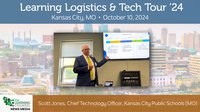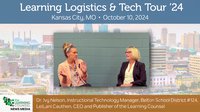CEO Penda Learning, Corey Peloquin strives to make life easier for teachers. Ever since he was a middle school science teacher, he looked for solutions to easily and quickly evaluate students work. He knew the importance of not having to wait a week or more to figure out if the students got something correct or incorrect. “Especially if they've gotten it incorrect and they don't know it. It's just such a disservice that they continue to build their knowledge around what they think was correct or a mistake,” explains Peloquin.
It became his passion of infusing technology and implementing multimedia into his lessons. “I was trying to bring as much of the outdoors in terms of science into the classroom because we didn't have things like Discovery Ed, and all these various platforms where you can pull up the different science movies and stuff,” explains Peloquin. “It was basically, Bill Nye the Science Guy on VHS. That's all that there was available in multimedia for science.”
His passion continued into his position at Penda Learning https://www.pendalearning.com/about-penda. The company’s mission is to help raise student math and science achievement in schools while reducing the workload of teachers and school administrators. Through innovative features and automated functionality, Penda supports data-driven instruction in math and science classrooms, response to intervention at all levels, and differentiated instruction. “We are laser-focused on math and science school improvement through these pedagogical best practices, all without adding one more thing (for teachers or administrators) to do,” explains Peloquin.
Operating on the premises that students love learning math and science because of the game mechanics and competitive element, Penda engages students during learning, so they advance with their work monitored by their teachers in real-time on a weekly basis. “Our product has had gamification and avatars as part of the student experience for at least 5 years. There's a great amount of research that validates authentic engagement, getting students engaged emotionally in learning in order to unlock cognitive engagement, short-term and long-term memory transfer,” adds Peloquin.
Penda Learning has supported Duval County Public School's science instruction and science intervention in grades 5, 8, and high school biology since August 2016. “Although we would have ideally wanted to look at student-level data, after the first year of implementation,” explains Peloquin. “We partnered with the district to compare and contrast school-level data - specifically each school's mean scale score and the percentage of student performing at level 3 and above from the 2015-2016 academic year, before implementing Penda, to the 2016-2017 academic year, the first year of implementation.”
The results showed 76 schools increased their mean scale score, and 82 schools increased the percentage of students achieving level 3 and above. “We were proud of the gains made in science in just the first year of implementation, which energized us to make even greater impact the following school year,” adds Peloquin.
Duval teachers applied Penda to a larger range of instruction during the 2017-2018 academic year. They focused more on data-driven instruction and intervention features to support RTI (Response To Intervention) level 2. The district requested an independent evaluation study as an attempt to compare student usage to student performance outcomes. They analyzed student performance outcomes alongside their Penda usage in which there were positive correlations among hours of engagement using Penda and SSA/EOC (Statewide Science Assessment/End Of Course) scores, as well as the number of activities a student mastered. The turn-around school data was analyzed against non-turn around schools which revealed the achievement gap narrowing within turn-around schools. “The 2017-2018 impact evaluations greatly validate Penda's efficacy research and are helping schools and Penda staff optimize math and science implementation strategies to yield even bigger gains,” explains Peloquin. (“Turnaround” is a dramatic and comprehensive intervention in a low-performing school that: a) produces significant gains in achievement within two years; and b) readies the school for the longer process of transformation into a high-performance organization.)
One challenge the company faced is teachers not utilizing all the available technology. Penda’s Pacing Assistance Service (PAS) was perceived by teachers to be on auto-pilot and therefore didn't interact much with their teacher account, and that was a complete under-utilization of dynamic features and functionality. “Teachers weren't aware of or weren't leveraging the ability to create intervention groups for RTI - level 2 intervention, which then unlocks the ability to differentiate instruction by assigning different activities to different class periods, intervention groups, or even individual students and advanced progress-monitoring report filters - being able to progress-monitor a specific intervention group in just 3 clicks at any time, in real-time,” explains Peloquin.
Penda resolved the situation by identifying a gap in their teacher user-experience journey by using multiple data points and that's when they made a shift in paradigm - backward design from the student, teacher, and school administrator’s perspective. “What was the end goal? What was the optimal teacher journey from start to finish? What would a teacher (new or veteran) need, to get from one point to the other? Using Apple's Classroom of Tomorrow model as an exemplary, we carefully redesigned our teacher user-experience journey first. We abandoned our professional development that was in place and started over at the drawing board, and what came of that was a progressive PD plan that focused on one instructional best practice alongside the Penda feature or function that supported it,” explains Peloquin.
In 2015, the new designed PAS became available. Teachers now understand how Penda supports best practices and reason for best practices. “As a teacher myself, I always learned the most and found it easiest to implement into my instruction or classroom when I saw something done by another colleague, the final product and/or the supporting document or resource used along the way - again that backwards-engineering practice,” explains Peloquin.
Penda continues to modernize and optimize their PD. “Just a month ago, we moved our PD to an online on-demand platform, making Penda professional development even more accessible to teachers whenever they are ready to complete it. We're excited to leverage our on-demand PD platform and expand it. We have students, teachers, and school administrators from some of the largest districts in the United States counting on us to deliver a high-quality product that's proven to make math and science gains, so we can't afford anything less than excellence.”











